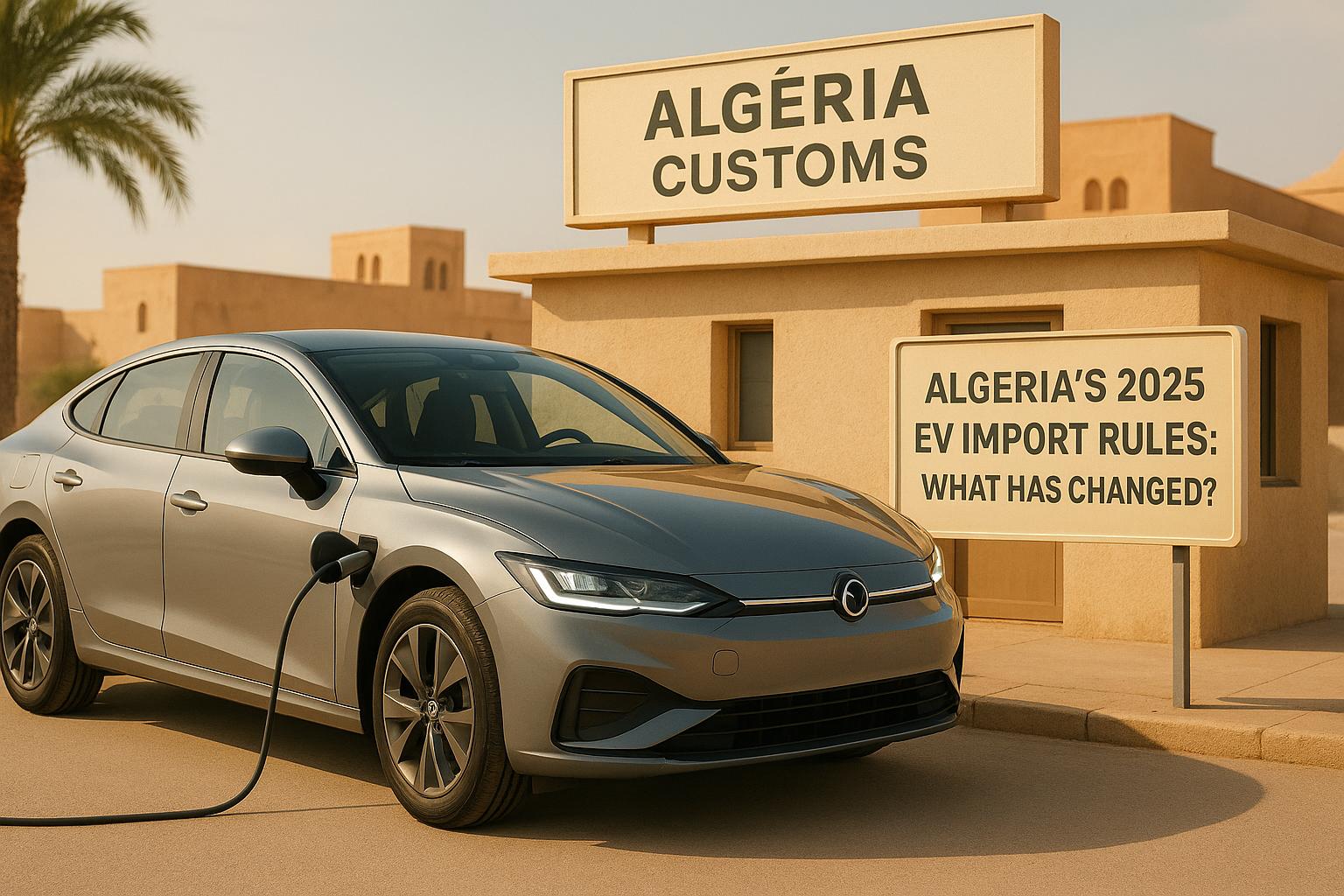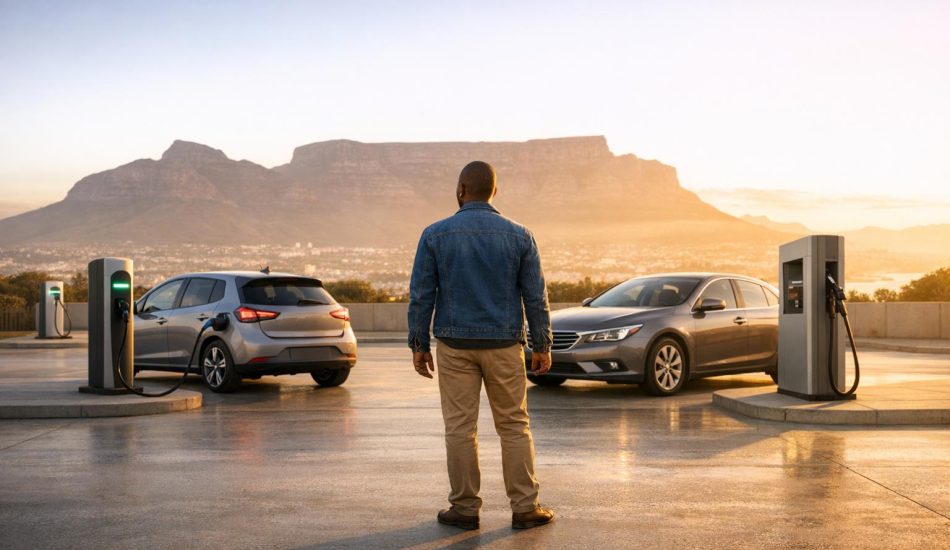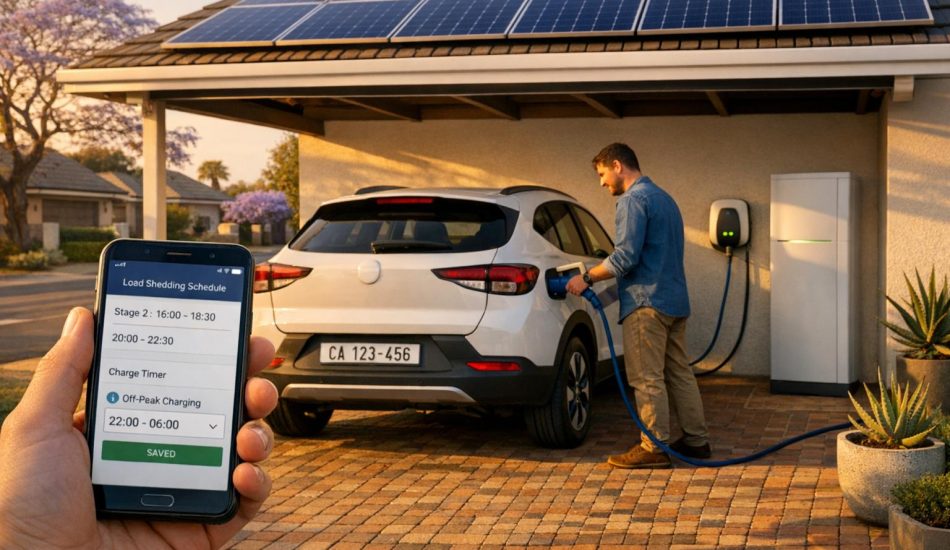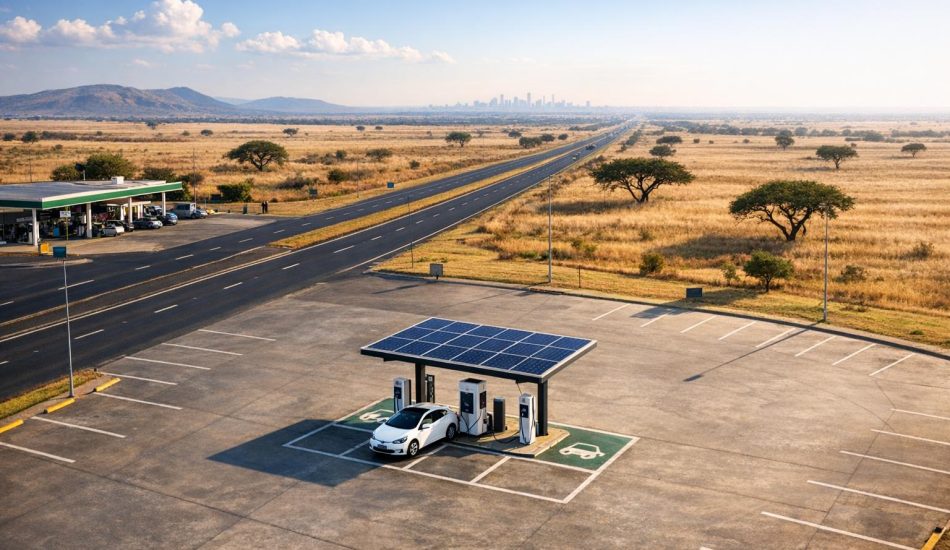
In 2025, Algeria introduced new rules for importing electric vehicles (EVs) with three key changes: stricter age limits for imported vehicles, the allowance of fully assembled EV imports, and an expanded range of eligible vehicle types, including plug-in hybrids and hydrogen-powered cars. These updates aim to modernize the market while maintaining high standards.
Key Changes:
- Age Limits: Only newer EV models with advanced features are allowed.
- Fully Assembled Imports: Complete Built Units (CBUs) can now be imported, offering more options to buyers.
- Expanded Categories: Battery electric, plug-in hybrid, and hydrogen-powered vehicles are now eligible.
Impact:
- For Importers and Dealerships: Easier access to global EV models but stricter compliance requirements.
- For Consumers: More options and better technology but potential price increases for entry-level models.
These changes aim to improve Algeria’s EV market while addressing quality and accessibility.
Nouvelles facilitations pour l’importation de voitures en Algérie
What Changed in Algeria’s EV Import Policies
Algeria has introduced new regulations for electric vehicle (EV) imports set to take effect in 2025. These updates are designed to modernize the market while maintaining strict quality standards. The changes focus on three main areas: vehicle age limits, import methods, and an expanded range of eligible EV types. Here’s a closer look at what’s new:
Updated Vehicle Age Requirements
The new rules enforce stricter age limits for imported EVs. This ensures that only models equipped with up-to-date technology and performance features are allowed. Additionally, specific tax measures are in place to discourage quick resale, encouraging longer ownership periods.
Allowance for Fully Assembled Imports
One of the most notable changes is the removal of restrictions on importing fully assembled vehicles. This means manufacturers can now bring in complete EV models directly, offering consumers more variety and reducing the reliance on local assembly facilities.
Expanded Vehicle Categories and Requirements
The updated policy broadens the scope of eligible vehicles to include battery electric models, plug-in hybrids, and hydrogen-powered cars. Each type is subject to specific conditions based on its level of market readiness, but all must comply with international safety standards to ensure quality and reliability.
How the New Rules Affect Different Groups
Algeria’s updated regulations on EV imports are set to reshape the automotive landscape, influencing importers, dealerships, and consumers in significant ways. Here’s a closer look at how these changes create both opportunities and challenges for each group.
Effects on Importers and Dealerships
For importers and dealerships, the removal of restrictions on fully assembled vehicle imports is a game-changer. This opens the door to a wider variety of internationally manufactured EVs, bypassing the delays tied to local assembly. On the flip side, stricter compliance requirements mean they’ll need to adjust their operations, particularly when it comes to managing documentation and ensuring faster inventory turnover. Smaller dealerships, however, stand to benefit from more flexible supply chains, which could help them cut delivery times and compete more effectively.
What Consumers Gain and Lose
Consumers are likely to see a broader selection of EV models, many of which will feature the latest safety standards and cutting-edge battery technology. The updated age restrictions ensure that vehicles meet modern performance and safety benchmarks. However, these changes might lead to price shifts – while competition could drive down costs for premium models, entry-level EVs may become pricier. On the bright side, quicker delivery times mean less waiting for new vehicles, enhancing the overall buying experience.
Benefits vs. Challenges Comparison
| Stakeholder Group | Key Benefits | Primary Challenges |
|---|---|---|
| Importers | Access to a wider range of global EVs; faster market entry for new models; reduced dependence on local assembly | Increased paperwork; need for quicker stock turnover |
| Dealerships | Greater variety of EVs to offer; improved delivery timelines; stronger connections with global manufacturers | Adapting to diverse specifications; meeting stricter regulatory requirements |
| Consumers | Expanded model choices; access to newer safety and tech features; potential savings on premium models | Higher costs for entry-level vehicles; short-term market adjustments |
As these regulations roll out through 2025, adaptability will be key for all parties. Importers and dealerships that streamline operations and build solid partnerships with manufacturers will likely thrive, while consumers should keep an eye on pricing and new model availability to make informed decisions.
sbb-itb-99e19e3
Growth Opportunities in Algeria’s EV Market
Algeria’s revised import regulations are opening doors for the electric vehicle (EV) market, even as challenges persist. The country’s automotive sector is already showing signs of recovery. Vehicle sales soared by an impressive 345.3%, reaching 113,122 units in 2023, and climbed further by 58.5% to 179,332 units in 2024. With this rebound and new policies aimed at EVs, the stage is set for exciting developments in the market. Here’s a closer look at how these changes could drive sales and broaden market access.
Boosting EV Sales
One of the most impactful changes is a regulation that mandates authorized dealers to include at least one EV in their offerings within five years. At present, the EV market in Algeria remains largely untapped. In 2025, for example, Dongfeng was the only brand reporting EV sales. This leaves a significant opportunity for new players to establish themselves as market leaders. Globally, EV sales rose by 25% to 17.8 million units in 2024 and are expected to hit 21.3 million units in 2025, making up 24% of total vehicle sales. These trends suggest there’s plenty of room for growth.
Additionally, new regulations require dealers to operate in at least 28 provinces within their first year of authorization. This ensures EVs will become accessible not just in major cities but also in more remote areas, helping to build a broader customer base.
Better EV Access for Buyers
While dealers face stricter requirements, consumers stand to benefit significantly. One of the most immediate advantages is the allowance for Complete Built Units (CBUs). This policy enables buyers to access the latest EV models without waiting for local assembly, ensuring they can enjoy cutting-edge battery technology and advanced safety features.
Consumer confidence is also being strengthened through enhanced protections. Authorized dealers are now required to provide a minimum 5-year/62,137-mile warranty, along with after-sales service and spare parts availability for the duration of the contract and an additional five years. Furthermore, dealers must establish comprehensive infrastructure, including showrooms, service centers, and storage facilities, ensuring professional servicing and support networks are readily available.
For international buyers and businesses looking to tap into Algeria’s growing EV market, platforms like EV24.africa offer a convenient way to explore electric vehicle options. With delivery services across African countries, they provide a valuable entry point as Algeria’s EV landscape evolves.
With strong regulatory measures, expanding infrastructure, and increasing global EV adoption, Algeria’s electric vehicle market is poised for rapid growth. While challenges remain, the opportunities for dealers, manufacturers, and consumers are becoming clearer every day.
How to Follow the New Rules
With the recent policy changes, adhering to Algeria’s updated EV import regulations is essential for seamless market entry. Importers and dealerships must meet stringent documentation and compliance standards to operate legally.
Required Documents and Customs Process
To import EVs into Algeria, you’ll need to provide documentation that verifies the vehicle’s identity, origin, and compliance with the latest manufacturing and age restrictions. For vehicles imported as Complete Built Units (CBUs), this includes proof of manufacture and origin. These documents are non-negotiable and ensure the vehicle meets Algeria’s updated rules.
In addition, importers are required to offer financial guarantees to cover potential duties, taxes, or inspection fees. It’s a good idea to double-check the latest requirements with customs authorities, as delays in clearance can occur if procedures or paperwork are incomplete.
Once the paperwork is squared away, the focus shifts to ensuring the vehicles meet rigorous safety and operational standards.
Meeting Compliance Standards
Imported EVs must align with international safety certifications and pass approved electrical testing protocols. Beyond this, dealerships and service centers are expected to demonstrate their technical expertise and equipment readiness to properly maintain EVs.
The updated licensing process for dealerships now demands robust service infrastructure, technically trained staff, and meticulous record-keeping. This includes maintaining detailed logs of sales, service histories, and compliance-related documentation – essential for staying on the right side of regulatory requirements.
For businesses planning to enter Algeria’s EV market, early preparation and a thorough understanding of these updated rules will be critical for a smooth entry and continued success in this evolving industry.
Key Points About Algeria’s EV Import Rules
Here’s a breakdown of the major updates to Algeria’s electric vehicle (EV) import regulations and what they mean for the industry.
Algeria’s 2025 EV import rules aim to modernize the automotive sector while setting stricter quality benchmarks. These updates bring both opportunities and hurdles, reshaping how EVs are imported and sold in the country.
One of the most impactful changes is the allowance of completely built units (CBUs). This means fully assembled EVs can now be directly imported, offering Algerian consumers a wider range of models to choose from.
Stricter age limits on imported EVs ensure that only newer, more advanced vehicles enter the market. While this raises the bar for technological standards, it could also increase costs for buyers looking for more affordable options.
Dealers now face higher expectations, including enhanced service infrastructure and better-trained technical staff. Businesses that invest in these areas – such as upgrading facilities, providing technical training, and maintaining detailed compliance systems – are likely to thrive. On the flip side, companies slow to adapt may find it hard to compete under these new conditions.
Larger importers may gain an edge due to higher guarantee requirements and more complex customs procedures. These factors could consolidate market power with bigger, better-funded players, making it harder for smaller businesses to keep up.
The overarching goal of these regulations is to build a more reliable EV ecosystem in Algeria, rather than simply opening the market to unrestricted imports. By emphasizing technical expertise, robust service networks, and compliance, the government aims to boost consumer confidence and ensure long-term support for EV owners.
For companies looking to enter this market, early preparation is key. Those who quickly adapt to the updated documentation requirements, invest in service infrastructure, and foster strong relationships with customs authorities will have a clear advantage in navigating Algeria’s evolving EV landscape.
FAQs
What are the age restrictions for importing electric vehicles under Algeria’s 2025 regulations?
Under Algeria’s updated import regulations for 2025, only used electric vehicles that are no older than three years will be allowed. This rule aims to ensure that imported EVs align with current performance and environmental benchmarks, reinforcing the nation’s efforts to promote cleaner and more efficient transportation options.
What impact will Algeria’s 2025 EV import rules have on local assembly plants?
Algeria’s revised rules for importing electric vehicles (EVs) in 2025 are unlikely to directly disrupt local assembly plants. Instead, these regulations aim to permit the import of fully assembled EVs, which could serve as a complement to the activities of domestic assembly operations rather than as direct competition.
By expanding the variety of EVs available in the market, these changes might open doors for local facilities to concentrate on assembling particular models or components. This shift could encourage greater specialization and offer room for new developments within the local EV industry.
What steps are being taken to ensure imported plug-in hybrid and hydrogen-powered vehicles comply with international safety standards?
To comply with international safety regulations, imported vehicles are required to include key features like Anti-Lock Braking Systems (ABS) and speed limiters. For vehicles with engines exceeding 1.2 liters, there are extra safety standards to meet. These include two front airbags, headrests for every seat, windshield and rear window defrosting systems, and anchors for child safety seats.
These requirements are designed to improve passenger safety while ensuring imported vehicles meet global standards, contributing to Algeria’s efforts to create a safer automotive market.




